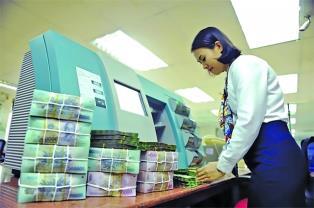Credit rating and sustainable finance are an important foundation for the Vietnamese banking sector to build a modern and efficient financial system that is resilient to global fluctuations.

Thu Hà
HÀ NỘI — Credit rating and sustainable finance are an important foundation for the Vietnamese banking sector to build a modern and efficient financial system that is resilient to global fluctuations, Vice President and General Secretary of Vietnam Banks Association (VNBA) Nguyễn Quốc Hùng said at a forum on Tuesday.
At the Vietnam Banking Forum 2025 held in Hà Nội by Fitch Ratings and VNBA, Hùng said that credit rating and sustainable finance are two key aspects in the operation of the banking system. A banking system with high credit capacity, transparently assessed, will create trust among investors and international partners. A sustainable banking system will ensure long-term prosperity, contributing to the economy’s green growth goals.
“In the banking sector, credit rating is considered an important financial passport, reflecting the financial capacity, management quality and reliability of credit institutions in domestic and international markets. It is not only an indicator to help access capital sources at reasonable costs, but also demonstrates transparency and is a measure of the readiness and integration ability of the national banking system,” Hùng noted.
According to Hùng, many Vietnamese commercial banks currently conduct credit ratings with reputable agencies. The results show that the credit capacity of Vietnamese banks has made significant progress, improving asset quality, capital safety, profitability and risk management. This is an encouraging signal of the internal capacity and financial transparency of the Vietnamese banking system.
Along with credit rating, Hùng said sustainable finance is a strategic orientation that the Vietnamese banking industry is strongly pursuing.
“The Vietnamese banking industry has proactively issued green credit policies, built a set of criteria for assessing ESG risks, deployed green financial products and issued green and sustainable bonds. Some banks have begun to apply climate risk assessment tools in their credit portfolios, expanded international cooperation to learn ESG best practices and raised green capital from international institutions,” said Hùng.
However, Hùng admitted that the development of sustainable finance in Việt Nam is still in its early stages, requiring a unified system of standards, a reliable ESG database and clearer incentive policies.
Phạm Thị Thanh Tùng, deputy director of the State Bank of Vietnam’s Department of Credit for Economic Sectors, reported that by September 30, 2025, green outstanding loans, mainly invested in renewable energy, clean energy and green agriculture, reached about VNĐ744 trillion (US$28.29 billion), up 9.4 per cent compared to the end of 2024 and accounting for nearly 4.2 per cent of the country’s total outstanding loans.
Willie Tanoto, senior director of Fitch Ratings’ Asia-Pacific Financial Institutions, said there have been improvements in the Vietnamese banking sector over the last decade and in regulation. Fitch’s assessment of the operating environment was upgraded five times in the last five years.
“We have an update on the Law on Credit Institutions, which should focus on improving governance. We now have better financial disclosure and transparency, including the public listing of all banks. The banking landscape has fundamentally changed, and the banking system today is far stronger than a decade ago.”
According to Willie, Fitch has positive outlooks on several banks’ asset quality scores. If asset quality measures remain stable, Fitch could upgrade these scores or set them to have a positive outlook.
However, he noted that risk profile scores are unlikely to be upgraded, because risks associated with rapid growth are a structural feature of Vietnamese banks and are likely to remain.
Willie also highlighted high leverage as a key constraint. The country’s leverage has grown from 75 per cent in 2012 to around 125 per cent by the end of this year. — BIZHUB/VNS
- Tags
- banking





